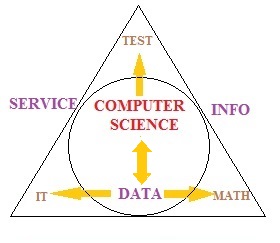Computer Science - Other
Homework Help & Tutoring
We offer an array of different online Computer Science - Other tutors, all of whom are advanced in their fields and highly qualified to instruct you.
Computer Science - Other
The Power of Facebook
Social networks have gained popularity over the last decade. They allow individuals to create personal profiles, connect with other users, and engage in active interactions. Social networks enable users to share different information such as news, photographs, ideas, or personal opinions and keep contact with family and friends. Founded in 2004, Facebook has become one of the world’s most influential social networks. In 2013, there were around 757 million active daily Facebook users and approx. 1.23 billion monthly Facebook users. Estimates predict the number of Facebook users worldwide will reach 1.34 billion users by 2018.
Research has reported that Facebook can benefit people with anxiety through enhancing their access to social support channels, or helping students to improve civic engagement skills and competencies. Research also suggests a positive correlation between problematic Facebook use and psychological disorders like anxiety and depression. Problematic Facebook use has been categorized as a subtype of Internet addictions and mimics the symptoms of behavioural addictions, especially among youth.
What is Internet Addiction
Internet addiction, also known as pathological internet use, compulsive internet use, and problematic internet use, is the persistent and maladaptive use of the internet. The internet addiction, as a general addiction and its specific forms such as online gaming, online gambling, and cyber pornography, is listed in the Diagnostic and Statistical Manual of Mental Disorders (DSM-5) that is used in the classification of mental disorders. Internet disorders can destroy lives. For example, online gaming has long been described in as part of the internet addiction and is listed under the Section 3 of the DSM-5. Literature reports several people have died and lost marriages due to online gambling. In one incident in Taiwan, an online gaming addict died after ten hours of playing. This, however, did not cause the other players in the room to stop using the internet even during the police investigation.
What is Facebook Addiction
“Facebook addiction” (also known as Facebook intrusion) is defined as excessive involvement in Facebook activities and is a frequent cause of problems in everyday social functioning. Facebook addiction is characterized by some of the features commonly observed in other addiction diseases such as tolerance, withdrawal, relapse, etc. There are many Facebook users who develop a strong pathological need to use this social network and are unable to control their urge to stay online. Facebook addicts express some typical characteristics of addiction disorders like silence salience (e.g., constant thinking of Facebook use), tolerance (e.g., requiring increasing time on Facebook to achieve previous positive using effect), mood modification (e.g., mood improvement by Facebook use), relapse (reverting to earlier use patterns after ineffective attempts to reduce Facebook use), withdrawal symptoms (e.g., becoming nervous without ability to use Facebook), and conflict (e.g., interpersonal problems caused by intensive Facebook use).
What makes Facebook addictive?
The Facebook company attempts to create an association between boredom and active use of their application’s content. Boredom is an internal factor, so this theory is based on the psychological nature of boredom. Many people perceive boredom as being painful, so Facebook provides an instant relief that is available with a click of a button. Alleviation of boredom is possible through scrolling down the newsfeed and checking what other people have been doing. This creates an illusion of real social involvement and creates an impression that we have done something useful to entertain ourselves.
What does Facebook do to make its content addictive?
There are several things which Facebook as a company does to contribute to people becoming addicted to its services. Besides the internal trigger for Facebook addiction which is boredom, installed Facebook application acts as an external trigger by continually pushing notifications each time a person we are connected to does something on their profile. Most people use their mobile phones out of the necessity to stay connected in case they need to contact someone by phone or message. Every time a person receives a notification, they suppose it is important, and that is how Facebook tricks its users into becoming addicted to its services. By showing icons which say “check your Facebook,” people get the impression that those notifications are really important. As time passes, a habit is created, and the need for notifications becomes insignificant as checking a Facebook account becomes an unintentional habit.
References
American Psychiatric Association (APA). (2013). Washington, DC. In Diagnostic and statistical manual of mental disorders (5th ed.).
Baer, D. (2014). The Science Behind Why Facebook Is So Addictive. Retrieved September 18, 2017.
Basak, E., & Calisir, F. (2015). An empirical study on factors affecting continuance intention of using Facebook. Computers In Human Behavior, 48181-189. doi:10.1016/j.chb.2015.01.055
Ghose, B. T. (2015). What Facebook Addiction Looks Like in the Brain. Retrieved February 22, 2016.
Greitemeyer, T. (2016). Full length article: Facebook and people's state self-esteem: The impact of the number of other users' Facebook friends. Computers In Human Behavior, 59182-186. doi:10.1016/j.chb.2016.02.005
Griffiths, M. D. (2013). Is “loss of control” always a consequence of addiction? Frontiers in Psychiatry, 4.
Guan, Y., & He, J. (2018). The effect of state self-control on the intertemporal decisions made by individuals with high and low trait self-control. Plos ONE, 13(4), 1-17. doi:10.1371/journal.pone.0195333
Indian, M., & Grieve, R. (2014).When Facebook is easier than face-to-face: Social support derived from Facebook in socially anxious individuals. Personality and Individual Differences, 59, 102–106.
Statista. (2018). Number of mobile phone Facebook users worldwide from 2013 to 2018 (in billions). Retrieved from Statista.
Suissa, A. J. (2014). Cyberaddictions: Toward a psychosocial perspective. Addictive Behaviors, 39, 1914-1918. doi:10.1016/j.addbeh.2014.07.027
Tang, J., Chen, M., Yang, C., Chung, T., & Lee, Y. (2016). Personality traits, interpersonal relationships, online social support, and Facebook addiction. Telematics and Informatics, 33102-108. doi:10.1016/j.tele.2015.06.003
To fulfill our tutoring mission of online education, our college homework help and online tutoring centers are standing by 24/7, ready to assist college students who need homework help with all aspects of computer science. Our computer science tutors can help with all your projects, large or small, and we challenge you to find better online computer science tutoring anywhere.
College Computer Science - Other Homework Help
Since we have tutors in all Computer Science - Other related topics, we can provide a range of different services. Our online Computer Science - Other tutors will:
- Provide specific insight for homework assignments.
- Review broad conceptual ideas and chapters.
- Simplify complex topics into digestible pieces of information.
- Answer any Computer Science - Other related questions.
- Tailor instruction to fit your style of learning.
With these capabilities, our college Computer Science - Other tutors will give you the tools you need to gain a comprehensive knowledge of Computer Science - Other you can use in future courses.
24HourAnswers Online Computer Science - Other Tutors
Our tutors are just as dedicated to your success in class as you are, so they are available around the clock to assist you with questions, homework, exam preparation and any Computer Science - Other related assignments you need extra help completing.
In addition to gaining access to highly qualified tutors, you'll also strengthen your confidence level in the classroom when you work with us. This newfound confidence will allow you to apply your Computer Science - Other knowledge in future courses and keep your education progressing smoothly.
Because our college Computer Science - Other tutors are fully remote, seeking their help is easy. Rather than spend valuable time trying to find a local Computer Science - Other tutor you can trust, just call on our tutors whenever you need them without any conflicting schedules getting in the way.






